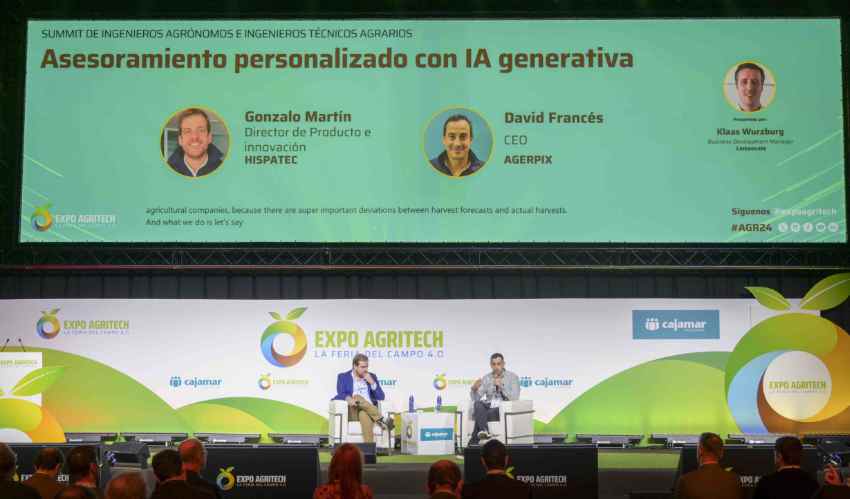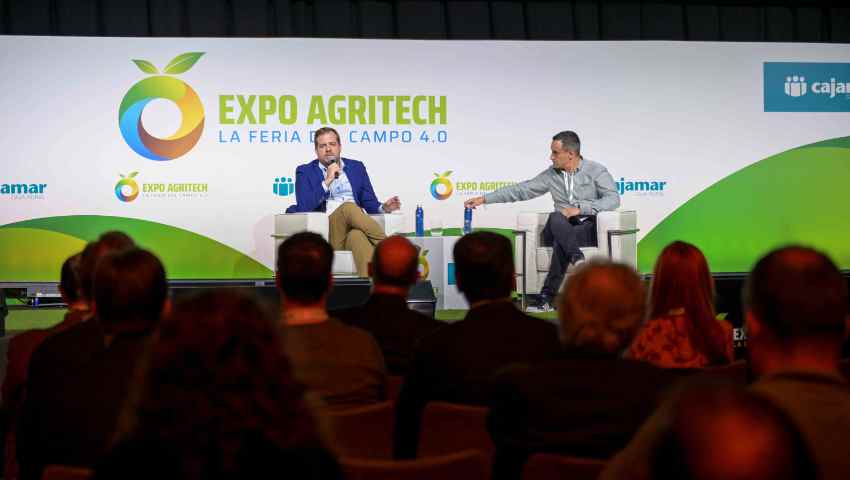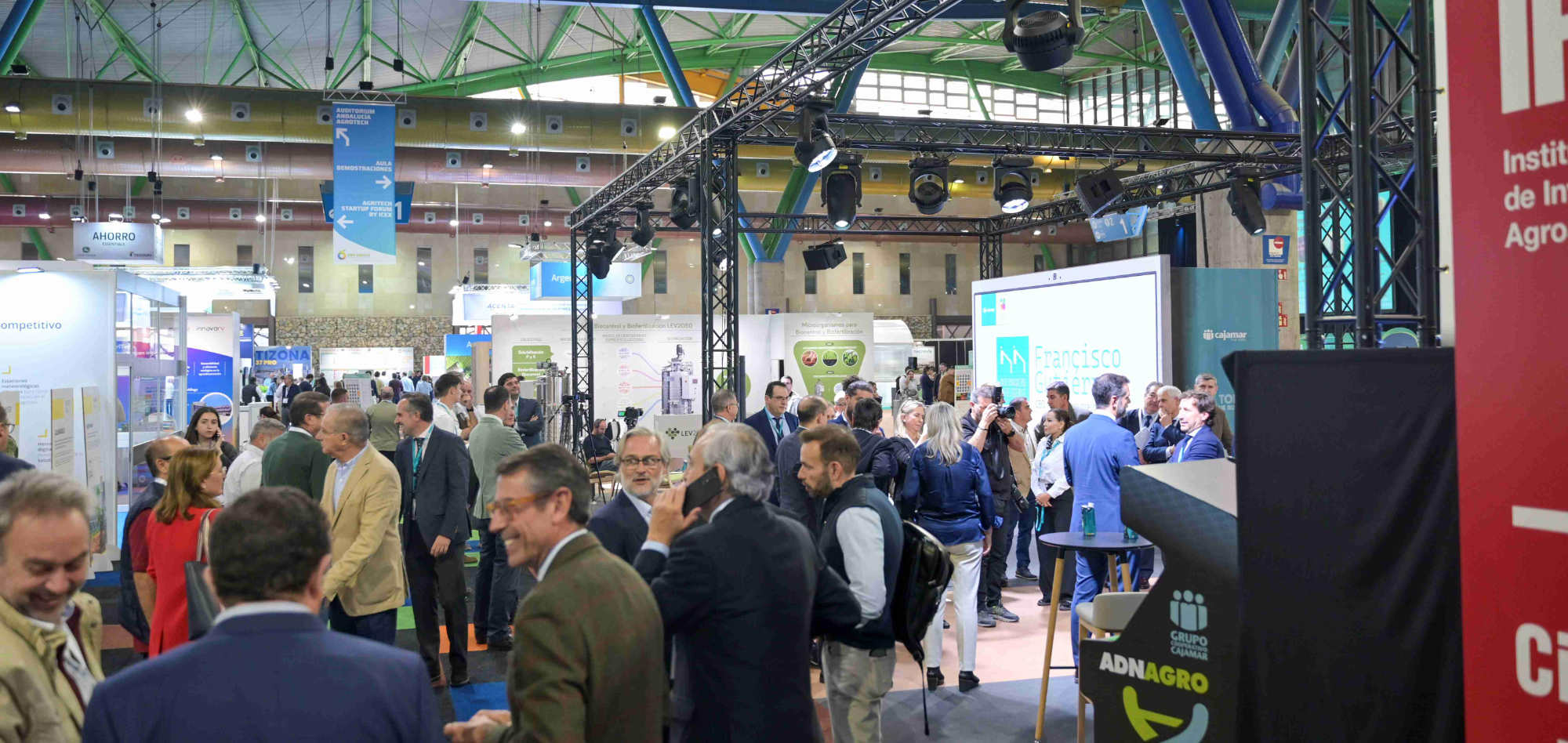Agriculture is entering a new era thanks to the integration of advanced technologies such as generative artificial intelligence, data analytics, digital twins or robotization. This has been highlighted by some of the experts in the field who have been gathered at La Feria del Campo 4.0 – Expo AgriTech 2024, the agricultural meeting dedicated to technological innovation, which is being held until Thursday, November 28, in Málaga.
During the second day of the event, which has the support of the Ministry of Agriculture, Fisheries, Water and Rural Development of the Junta de Andalucía and European ERDF funds, different agents of the value chain have agreed that the key to digitize the field lies in knowing that technological tools improve productivity, reduce costs and move towards sustainable practices. Thus, in an industry facing global challenges such as climate change or resource scarcity, technological innovation is positioned as a transformative engine for farmers and related and peripheral industries, as noted on the stages of the congress Expo AgriTech 2024.
In this context, Gonzalo Martín, Product and Innovation Director at Hispatec, highlighted the potential of generative AI to “become an expert advisor, capable of personalizing recommendations and optimizing decisions in real time”. David Francés, CEO of Agerpix, emphasized that “although AI should not replace human intuition, it can reinforce it with solid and accessible data. It also helps to adjust uncertainty so that subsequent decision making is better”. Regarding AI regulation on a global scale, both experts agreed that Europe must overcome regulatory barriers to compete globally with other places where legislation is less strict.
Data leads the way for the farmer
Data agriculture has been one of the most debated issues on the second day of the fair due to its projection for the coming years. Hamza Qadoumi, founder of the Swedish agritech firm Ecobloom, which has been recognized by Forbes as one of the most prestigious entrepreneurs for its social impact projects, presented his point of view on its use, advocating the generation of trust among farmers. For this reason, he said that it is key to “show them that these tools do not replace people, but rather empower them”.

For his part, Jesús Regodón, head of Digital Tools at Cajamar, explained the importance of designing technological solutions focused on the farmer, because “these professionals do not need to understand how technologies work, but how they help them to solve their problems and improve profitability. This requires that digital tools speak their language and that, from the beginning, they are the center of development”. To achieve this, Regodón said that training is crucial to overcome the barriers to adoption in a sector where the age of producers can be a challenge.
Along the same lines, Alejandro Fernández, Innovation Manager of La Caña Group, emphasized that “it is essential that the solutions are visual and easy to use, adapted to the needs of each producer and region. These professionals need to see tangible results, such as improved profitability, to trust these innovations”. Speaking in territorial terms, and according to the expert, these types of technologies can be crucial for locations such as Andalusia where water-related challenges are critical and where automation and the use of data will be fundamental in the next decade to make more efficient decisions.
Focusing on the impact of data management on the optimization of the production chain, Paula Ruiz, Director of R&D and Sustainability at Trops, emphasized that “in our case we work with the objective that the data collected through sensors and drones translates into more efficient decisions for our farmers. But this is only possible if the data is of quality and up to date, so we educate and motivate our partners to adopt these practices”.

Internationally, Beatriz Gómez, head of Area at the State Research Agency (AEI), highlighted the dimension of the Data Farming Partnership, an initiative that seeks to maximize the impact of investments through the development of projects that connect sustainability with agricultural monitoring. “The goal is to address real problems in the sector, such as the creation of secure data spaces that respect the sovereignty of farmers, and in 2025 we will launch a call to promote tools that facilitate this process,” explained Gómez.
Technology for more resilient products
Fruit growing is also undergoing a period of constant evolution. Silvia Fornalè, researcher at the Agrigenomics Research Center, discussed the potential of biotechnology and genomics to make products more tolerant to extreme climatic phenomena or, for example, to recover lost varieties. In this regard, Fornalè pointed out that these practices provide “customized solutions to increase resistance to pathogens and optimize crops”. About it, Anna Gras, a researcher at the Polytechnic University of Catalonia, presented Agríxel_ES, a digital standard that combines meteorological and agricultural data to improve resilience to climate change.



